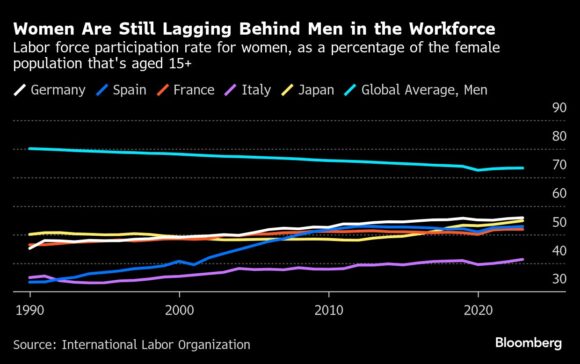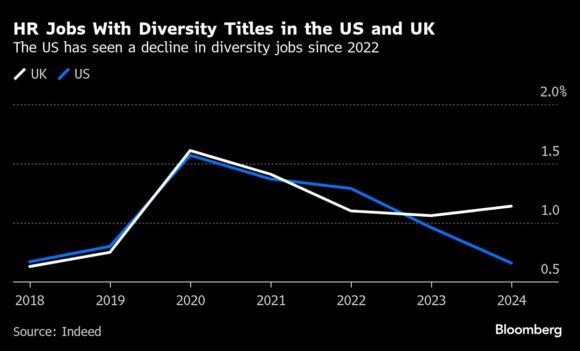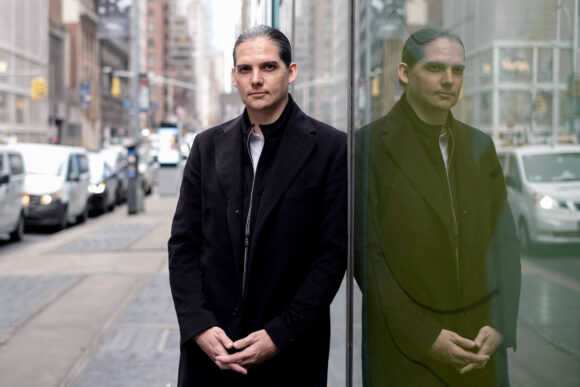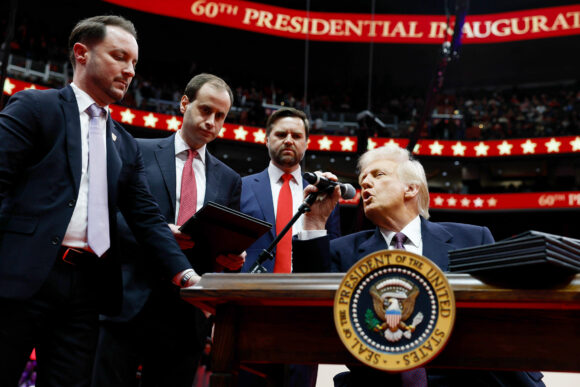Donald Trump’s executive order dismantling diversity, equity and inclusion efforts is making waves at international companies in Europe, Asia and beyond — but only on the surface. Quietly, many businesses are standing firm on diversity initiatives.
Companies from Roche Holding AG to Nissan Motor Co. have backpedaled on DEI policies in the US. But the Swiss drug maker says it has no plans to change its inclusion efforts elsewhere, while the Japanese car maker has left its international websites untouched. Volvo AB is going further: The car company hires “based on meritocracy, not quotas,” its spokesperson said, adding that positive action schemes such as its tecHER program will continue.
It’s what you might call DEI by stealth — an approach that, in various forms, has started to become the new normal for global companies outside the US since President Trump issued an executive order on Jan. 20 entitled “Ending Illegal Discrimination and Restoring Merit-Based Opportunity.”
US Anger Grows Over Global Reach of EU’s ‘Hostile’ ESG Rules
For American companies, there’s a degree of uncertainty around the directive. While US federal agencies and their suppliers are required to end any form of what Trump calls “illegal DEI,” such as affirmative action in hiring, the order doesn’t definitively say what measures companies are no longer permitted to take. And with robust federal anti-discrimination statutes still in place, it’s not even clear that the directive is lawful.
Outside of the US, the picture is even more complicated. Companies may wish to avoid unwanted scrutiny from the Trump administration, but complying with the spread of international diversity regulations is non-negotiable.
In jurisdictions from the UK and the EU to Australia and Hong Kong — where inclusion measures have primarily focused on gender rather than race — companies are legally required to meet targets for board diversity, gender pay gaps, pay transparency and reintegration of employees after long-term leave. Various countries have other requirements too. In Japan, top publicly listed companies must aim to promote women to 30% of director roles by 2030, up from about 16% last year. In the Netherlands, the financial sector is expected to consider accessibility to ensure older people are not cut off from basic services.
Nevertheless, few companies want to put their head above the parapet in the US, especially those with lucrative government contracts to lose. On top of the executive order, the president’s demand that US government agencies identify as many as nine potential civil compliance investigations in the private sector lit a tinderbox. No company wants to be the first to be accused of breaking the law.
More than 15 US companies have already altered language around diversity in their annual reports, while European companies are increasingly avoiding the topic on earnings calls.
“Ultimately, people are trying to pivot. They’re trying to keep up with what’s going on but without losing sight of that ultimate goal of inclusive workplaces,” said Zamena Ladak, senior vice president for DEI and business development at Assemble HR Consulting, a New Jersey-based talent strategy and leadership development consultancy.
Bloomberg contacted more than a dozen companies with headquarters around the world that make a significant portion of their revenue in the US about their diversity, equity and inclusion plans. Few issued a public statement. But it’s clear that boardrooms are under increasing pressure — from lawyers as well as staff — to work out how to tread the DEI tightrope.
Legal Obligations
Supporters argue that DEI strategies are about business survival and economic growth, as well as benefits for individual workers. Companies with more gender diversity are more likely to innovate, according to research published in the journal Innovation: Management, Policy & Practice. However, while many firms say they have recruited without bias for decades, few can boast a representative workforce — in fact, many initiatives have led to even more homogeneity, according to analysis by academics Frank Dobbin and Alexandra Kalev.

Countries where a significant portion of women are economically inactive or underactive are missing a growth opportunity, a particular problem for countries with an aging or shrinking population such as Germany, Spain, Italy, Japan and South Korea. In Japan, where a third of the population will be over 65 years old by 2040, the economy is already suffering, while Germany needs an influx of hundreds of thousands of migrant workers a year simply to prevent its labor force from shrinking.
By helping companies close the gender pay gap and finding other ways to make the workplace more equitable, DEI teams help to keep women working or increase their hours, according to a 2020 report by Mercer Inc.

They can help companies meet their legal obligations too. In the UK, companies’ responsibilities include avoiding discrimination in hiring and taking “reasonable steps” to prevent sexual harassment. Doing so effectively means firms need to educate staff about what discrimination, harassment and victimization — which can be subtle or inadvertent — look like. “Having DEI programs helps them comply,” said Georgina Calvert-Lee, an employment lawyer at Bellevue Law.
But training on controversial topics like unconscious bias has in some cases already been rebranded. Now, there’s “less emphasis on this idea that we’re all biased or terrible people,” said Kate Dodd, an employment lawyer at Pinsent Masons and head of the firm’s Brook Graham diversity and inclusion consultancy. Instead, the focus is on using data to examine why specific minority groups may progress through a firm more slowly or exhibit higher attrition rates.
Many international companies are viewing the DEI retreat in the US through the lens of a four-year presidential term, according to Alexandra Evreinoff, managing director at INvolve, a London-based diversity and inclusion consultancy that has worked with clients such as Boston Consulting Group, HSBC Holdings Plc and Standard Chartered Plc.
Two large European multinational companies that work with the federal government told Bloomberg they won’t alter DEI policies unless the executive order is enforced. The move is seen as being in the best interests of customers and staff, according to a person familiar with the matter who did not wish to speak publicly for fear of reprisals.
While Sumitomo Mitsui Financial Group Inc. wiped references to DEI from its American websites, the Japanese company left its international websites untouched, describing the US changes as part of a global digital restructure “after many months of planning.” UBS Chief Executive Officer Sergio Ermotti said last month that the Swiss bank was making no changes to its DEI policies — but its sustainability and annual reports, published Monday, no longer refer to “DE&I.”
And several banks headquartered outside the US, such as HSBC, Deutsche Bank AG, Barclays Plc and Banco Santander SA, have publicly reaffirmed their commitments to DEI and workforce representation targets, even as some Wall Street banks have backpedaled. In its annual report, HSBC described having a workforce that reflects society as a “strategic priority.” In January, Deutsche Bank CEO Christian Sewing called DEI “integral” to the company.
“I know what diversity has brought us on the management board at the top reporting level,” he said. “That’s why we are strong supporters of these programs.”
In fashion and retail — sectors where women make up an important part of the consumer base — companies including Germany-based Adidas AG, Hennes & Mauritz AB and Ikea have explicitly retained their DEI focus. “Our commitments in this area remain unchanged and are closely connected with our company’s purpose,” a spokesperson for H&M said.
Some European pharmaceutical companies are pushing on too with a commitment to inclusive clinical trials, according to people familiar with the situation. Their position is grounded in science as well as business: Testing the efficacy and side effects of new products requires women and individuals from underrepresented groups to take part in drug trials.
“We need to have a continuous focus on this,” Martin Holst Lange, Novo Nordisk A/S’s development chief, said this month. It’s also important to include patients of diverse socioeconomic status, he said.
In other sectors, the outlook is more mixed. Consulting giant McKinsey & Co. sent a carefully crafted memo to staff emphasizing that the company is still focused on inclusion, while noting that it abides by local law — a strong hint that it’s complying with anti-DEI measures in the US. Deloitte looked ready to drop its diversity policies globally before its partnerships in the UK and Australia said they wouldn’t make any changes locally. Meanwhile, Accenture Plc was among the first non-US-headquartered companies in any sector to ditch its global DEI policies. All three have a lot to lose by defying Trump. Their combined revenues as federal government contractors were in excess of $7.8 billion in the fiscal year to Sep. 30, according to Bloomberg data.

Conservative Activism
While companies are now scrambling to find the right language to describe their plans around diversity, equity and inclusion, the president’s crusade can’t have come as a total surprise. During his presidential campaign, Trump railed against “anti-White racism” and “illegal” DEI measures. A blizzard of conservative activism and lawsuits also raged in the lead-up to the elections.
In 2023, the Supreme Court effectively ended affirmative action concerning race in college admissions, after lawyer and anti-affirmative action activist Edward Blum sued Harvard. Even though the ruling didn’t extend to businesses, it created a chilling effect around race-related measures in recruiting.
The Supreme Court is now hearing a discrimination case brought forward by a White woman who claims she was first denied a promotion and then later demoted because she is heterosexual. If successful, the case could pave the way for more discrimination suits from members of majority groups.
In the short term, lawyers are urging global companies with an American presence to “hit the pause button” on any programs in the US that might benefit specific demographics, according to INvolve’s Evreinoff.
Global companies are looking for “a good balance between the regional approach and the global strategy,” said Evreinoff, given the legal requirements they still have to meet abroad.
Even so, in the UK at least, conversations with professionals in DEI-related roles indicate a subtle shift has taken place over the past two years. The country is among the most advanced in terms of DEI development, but a worsening economic outlook has led to something of a pullback.
A 2024 survey by campaign group Reboot found that about 40% of respondents at financial services firms said budget cuts had hampered DEI efforts.

“This is where we see who was really committed to diversity, equity, inclusion and for whom this was a matter of compliance,” said Michael Smets, professor of management at Oxford University’s Saïd Business School.
Sense of Unease
In the UK, diversity-focused roles in human resources departments, while below a peak in 2020, have remained steady since 2022, according to the job search website Indeed.
But the number of senior roles, particularly chief diversity officer, has “fallen off a cliff in EMEA” over the last 18 months, according to Raj Tulsiani, CEO of Green Park, a UK-based recruitment firm that specializes in more equitable leadership. And DEI teams have shrunk at many firms, according to Pinsent Masons’ Dodd.
Right-leaning UK newspapers such as the Daily Mail and the London-based Times have described DEI roles in public organizations such as the police or universities as wasteful spending. Kemi Badenoch, the leader of the opposition Conservative party, last month described diversity programs as “the real poison of left-wing progressivism.”
Given the pace of the retreat in the US, it remains to be seen what the next 12 months will look like for diversity, equity and inclusion around the world. In an interview, conservative activist Robby Starbuck, who has pressured a number of US companies to cancel inclusion programs, called DEI and ESG policies “anti-Western” and suggested that he has broader ambitions overseas. “We pushed this out there and it’s our responsibility to bring it back in,” he told Bloomberg.

Yet the US and other countries may be on a path to diverge further still. The British government has plans to extend mandatory pay gap reporting to ethnic minority workers, while a series of lawsuits over equal pay promises to force companies to consider gender disparity in specific roles, not just across the business. Meanwhile, companies with EU staff are gearing up for pay transparency disclosures from next summer, which will require firms to address any gaps larger than 5%.
Either way, a sense of unease remains pervasive. At one European multinational with a large US presence and a federal contract, there’s a rumor doing the rounds that bots are crawling the websites of private companies, searching for DEI buzzwords that might breach the president’s executive orders.
In early February, the company tore down various DEI-related webpages, before reinstating them a few days later, absent some key phrases and terms. Still, the company has no grander plans to change its inclusion strategy.
For a lot of companies outside the US, the focus now is merely “repositioning,” said INvolve’s Evreinoff.
“It would be complete nonsense to say we’re scrapping everything that’s DEI,” she said. “That’s not true.”
Photograph: Trump signs executive orders at the 60th presidential inauguration parade in Washington, DC, on Jan. 20, 2025. Photo credit: Anna Moneymaker/Bloomberg
Related:
- EU Mounts Major Retreat From ESG Agenda Amid Fierce Backlash
- Companies Walk ESG Tightrope, Under Fire From All Sides Over Disclosures
Topics Europe
Was this article valuable?
Here are more articles you may enjoy.



 AI Claim Assistant Now Taking Auto Damage Claims Calls at Travelers
AI Claim Assistant Now Taking Auto Damage Claims Calls at Travelers  Preparing for an AI Native Future
Preparing for an AI Native Future  Florida Regulators Crack the Whip on Auto Warranty Firm, Fake Certificates of Insurance
Florida Regulators Crack the Whip on Auto Warranty Firm, Fake Certificates of Insurance  Experian Launches Insurance Marketplace App on ChatGPT
Experian Launches Insurance Marketplace App on ChatGPT 

